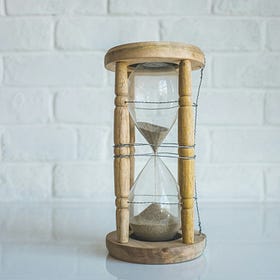What's with Hypothetical Questions in Discernment?
Is wondering 'what if' always helpful?

Do you ever find yourself asking hypothetical questions in discernment?
» Should I have taken the other job?
» Would it have been better if I had said no?
» Will I be happier if I move out of state?
» Did God actually want me to say yes?
» Was that the wrong decision?
It’s pretty common to want to explore the path(s) not taken. Despite being finite creatures who are limited by space and time, we can often find ourselves wanting to live outside of those boundaries. (Why else would stories about traveling through space and time be so attractive to so many?)
There can be real value in asking good hypothetical questions. (Many a beloved novel is the fruit of someone asking, what if…) But sometimes our hypothetical questions about the past are spurred on by unhappiness in the present. Sometimes our hypothetical questions about the future are spurred on by fear of repeating the past. And sometimes our hypothetical questions about God’s will are spurred by doubts about our own desires.
What Would It Change?
Recently I came across an ad for a device that could collect information about a medical condition I have. I’d never seen something so advanced and wondered if maybe I should buy it. Thankfully the price tag was high enough to make me pause before handing over my credit card info, and in that pause I was able to ask myself what I thought this device would do for me.
I asked myself a hypothetical question: if I had the information this device could give me about my health, what would change? What would I do differently?
Asking this hypothetical question revealed something important:
The information this device can give isn’t information that would make me seek a different kind of treatment than I’ve already sought.
The information I might get about myself wouldn’t actually change my actions in any way.
So what would it change?
I considered the possibility that it might change my mindset, somehow - that knowing if things were getting better or getting worse might change the way I think about myself, or the way that I factor my health in to my decision-making. The problem is that I’ve lived with my body long enough now to know that most of the time I end up in “borderline” territory, which, honestly, is partly infuriating and partly comforting because at least I don’t end up in checking the ‘worst case’ boxes on the tests. But if I did check out as ‘worst case scenario’, at least I’d have a clearer perspective.
See that hypothetical thinking cropping up again? If only I knew x, that might be better in y ways.
The truth is, the nature of possibility means that in most situations, changing something will yield better results in some ways and worse results in others. We can’t know the particulars, but we can know that there are pros and cons to almost everything. Sure, some things are definitely better than others, but there are a surprising number of things in life that fall into the “generally ok in some ways and not in others” category.
So why are we so concerned with hypotheticals, especially when it comes to decision making?
I have a few ideas.
(1) We Want More
The first one is fundamentally theological. We’re finite creatures, but we are made, ultimately, for eternity with God who is beyond all limits. To quote St. Augustine, “our hearts are restless until they rest in you, O Lord.” There is a longing in us for more, and whenever we’re disappointed by something in this created universe, we feel frustrated. Sometimes we think that exploring hypotheticals will lead us to the satisfaction we’re craving.
Now, if we’re craving a steak, but ordered the chicken instead, there’s a real likelihood that hypothetically, the steak would have been more satisfying. But there are plenty of situations in which what we’re looking for is something beyond created possibilities. To quote John Paul II:
“It is Jesus in fact that you seek when you dream of happiness; he is waiting for you when nothing else you find satisfies you; he is the beauty to which you are so attracted; it is he who provokes you with that thirst for fullness that will not let you settle for compromise…”
Sometimes our “what if”s are really, deep down, about longing for Heaven.
(2) We Want To Learn From Our Mistakes
Other times, we look back on the decisions we made, and the outcomes that those decisions yielded, and we’re unhappy. We don’t want to make the same mistakes again. This is a good thing!
Reflecting on our past decisions is often an important part of the discernment process, as long as we’re careful to make a distinction between the decision and the outcome. It’s possible to make good decisions with bad outcomes because the outcome isn’t always in our control - so when we try to learn from past mistakes, it only works if we’re clear about what the mistake actually was! Not being able to see the future or predict the unpredictable are not mistakes. They’re just part of being human.
(3) We Want To Wallow
Wanting to learn from the past can have a flip side: wanting to wallow in our mistakes. Look, it’s important to confess our sins when we’ve sinned. But if we wallow, we’re doing something God doesn’t do. He forgives and forgets; we sometimes cling to our mistakes like some kind of broken life raft: If only I hadn’t done x! If only I hadn’t done y! I must replay these things over and over again as a form of self-flagilation!
The thing is, there’s a natural tendency in us to want to make amends when we’ve harmed others. That’s a good thing; to the extent that we can do so, we should. But mental self-flagilation doesn’t actually do anyone any good.
What’s more, sometimes there can be a bit of secret pride lurking in this habit: look at me, my sinful choices are so big they’ve ruined everything. I’m so terrible, nobody loves me, everybody hates me, I’m gonna go eat worms…
God is bigger than any of us, and any of our choices. Our decisions do have consequences, but even those take place in the context of “God working all things together for the good of those who love him.” (Rom 8:28)
(4) We Want To Escape Our Present Reality
When it’s cold and grey and rainy for what feels like the millionth day of January, it’s a lot easier to wonder what life would be like if we had booked a holiday in the Bahamas. While there’s nothing wrong with a little healthy daydreaming, there can be a kind of escapism that comes with constantly dwelling in what is only possibility and not reality.
Sometimes, we need to do the work to make the daydream come true (save our pennies for that holiday); other times, there are things that “just must be borne.” Denise Trull’s words about her recent experience of cancer and its residual side-effects apply to all of us:
“When I realize that I cannot will these symptoms away by sheer will power, then I must rest in them. I must wait for them to get better, or I must accept them as they must be accepted. I cannot force them to be anything else. I must admit who I am and what they are. It is always a good, but so difficult a thing, to admit that you cannot change certain things but must ride along with them to see what lessons they will lead to.”
The art of acceptance is a difficult one to learn - one that can take a lifetime. Still, it’s worth it.
Your turn: are you the kind of person that asks a lot of hypothetical questions? What have you found to be underneath that tendency? Tell me about the role ‘what if’ plays in your life.
In Case You Missed It:
These two articles seemed to ring true with a lot of readers!
Do You Procrastinate?
Several years ago, I began to notice a pattern, both in myself and in many of my clients. The person who described herself as a ‘perfectionist’ would also name procrastination as a typical problem. This puzzled me - weren’t perfectionists and procrastinators two different types of people?
Why Deadlines Are Worth Celebrating
This is not a story of how I learned to get things done ahead of time. It’s a story of how I learned to embrace how I naturally work, which is right up against a deadline.





“It’s possible to make good decisions with bad outcomes because the outcome isn’t always in our control.” I thought that was such a good point, and has given me some good food for thought. Thanks!
This is really helpful. “What would change?” is a practical way to start with what we already know. Thank you! 🙏